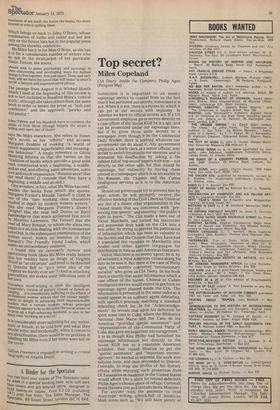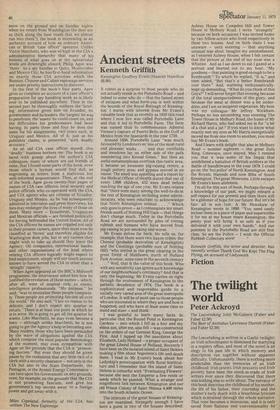Top secret?
Miles Copeland
CIA Diary: Inside the Company Philip Agee (Penguin 95p) Sometimes it is important to an enemy espionage service to conceal from us the fact that it has purloined our secrets, sometimes it is not. When it is not, there is a means by which it can get at our secrets with impunity. In America we have no official secrets act. If a US Government employee gives secrets directly to a case officer of the Soviet KGB he is a spy, and can be prosecuted under our espionage laws. But if he gives those same secrets to a newspaper, even though it be the Communist Daily Worker, there is nothing whatever our government can do about it. Any government employee, a lowly clerk or a senior official, may decide to switch loyalties to our enemies, and to dramatise his disaffection by taking a file cabinet full of 'top secret' papers with him not directly to the other side, for that would be espionage, but indirectly by having them printed in a newspaper which is as accessible to the Russian, the Chinese and the Cuban intelligence services as it is to the American public.
Should our government try to prevent him by legal action, he will promptly receive the effective backing of the Civil Liberties Union or any dne of a dozen other organisations in the United States that are concerned with "preserving free speech" and ensuring "the public's right to know." The CIA made a hero out of Victor Marchetti, and turned his inaccurate and somewhat drab book on the CIA into a best-seller, by trying to prevent his publication of information which has been so valuable to the Soviets and the Chinese that they have had it translated (no royalties to Marchetti) into Arabic and other Eastern languages for distribution in Asia as anti-American literature.
Victor Marchetti is no enemy agent; he is, by all accounts, a loyal American citizen doing his duty as he sees it. But there is the case of Philip Agee, the recently converted "revolutionary socialist" who gives us CIA Diary. In his book there is exactly that secret information which a case officer of the Soviet, Chinese or Cuban intelligence service would expect to get from an espionage agent planted inside the CIA. The information is presented in the same order as it would appear in an ordinary agent debriefing, with specifics precisely matching a standard debriefing check list. In his "Acknowledgements" he reveals that upon his defection he spent some time in Cuba, where the Biblioteca Nacional Jose Marte and the Casa de los Americas "provided special assistance" and "representatives of the Communist Party of Cuba also gave me important encouragement." It is as though Kim Philby had furnished his espionage information not directly to the Soviet KGB but to a reputable American
publisher, then visited Moscow to get the "special assistance" and "important encour agement" he needed to organise his work into suitable form, and then proceeded to Denver, Colorado, to reap the profits of his literary efforts while enjoying such protection from DI 5 assassins as residence in the United States would afford. (As a place for retired defectors, Philip Agee's chosen place of refuge, Cornwall, beats Havana just as Colorado beats Moscow.) For anyone with the patience to read diary-type writing (chock-full of letters-toMom notes such as "We still have plenty of
snow on the ground and on Sunday nights when we return from Washington the deerare so thick along the base roads that we almost run into them"), the book is interesting as an authentic account of how an ordinary American or British 'case officer' operates. Unlike Victor Marchetti, who was so high in the CIA's administrative hierarchy that many of his notions of what goes on at the operational levels are downright absurd, Philip Agee was 'there.' As a spy handler in Quito, Montevideo and Mexico City, he has first-hand information on exactly those CIA activities which the Russian, Chinese and Cuban espionage services are under priority instructions to discover.
In the first of the book's four parts, Agee gives as complete an account of a case officer's preparation for spy handling work as is likely ever to be published anywhere. Then in the second part he thoroughly outlines the 'briefing' information given him on Ecuador, its government and its leaders, the 'targets' he was to penetrate, the 'assets' he could count on, and the difficulties his predecessors had been having. In parts three and four he does the same for his assignments, two years each, in Uruguay and Mexico. All of it, just as his publisher claims, is presented "with deadly accuracy." As an old CIA case officer myself, this "deadly" business bothers me. The book is so laced with gossip about the author's CIA colleagues, many of whom are old friends of mine, that I found some parts of the book, even those which a layman would find dull, as engrossing as letters from a malicious but well-informed acquaintance. Then, at the end of the book, Agee gives twenty-four pages of names of CIA case officers, local security and police officials who co-operated with the CIA, and CIA agents who are citizens of Ecuador, Uruguay and Mexico. As he has subsequently admitted in television and press interviews, h is lists may endanger the lives of many of those on them. Many more — Ecuadoran, Uruguayan and Mexican officials — are finished politically for having befriended the United States. All of the CIA officers he names are crippled not only in their present careers, since they must now be classified as 'blown' and therefore eligible for Washington desk jobs, but in any careers they might wish to take up should they leave the Agency. Oil companies, international banks, and other organisations of the kind Where retiring CIA officers logically might expect to find employment, simply will not touch anyone known to have served the CIA in other than a 'straight' capacity.
When Agee appeared on the BBC's Midweek programme, the interviewer asked him how he justified the revelation of these names — which, after all, were of interest only to enemy intelligence professionals. "My purpose," he said, "was to neutralise these people completely. These people are promoting fascism all over the world." He also said, "I see no reason to be delicate, and I don't expect any quarter in return." There is at least one point in which he is in error. He is going to get all the quarter he wants. Like Marchetti, he may even become a• hero — although unlike Marchetti, he is not going to get the Agency's help in becoming one. Many readers, those who have been persuaded by the wave of allegations against the CIA which comprise the most popular demonology of the moment, may even sympathise with Agee on the grounds that the CIA is "promoting fascism." But even they should be given pause by the realisation that any little twit of a clerk with a security clearance — not only in the CIA but also in the State Department, the Pentagon, or the Atomic Energy Commission — can turn upon his Government on any grounds, even, for example, on the grounds that the CIA is not promoting fascism, and give his government's top secrets away to a foreign power and get away with it.



























 Previous page
Previous page